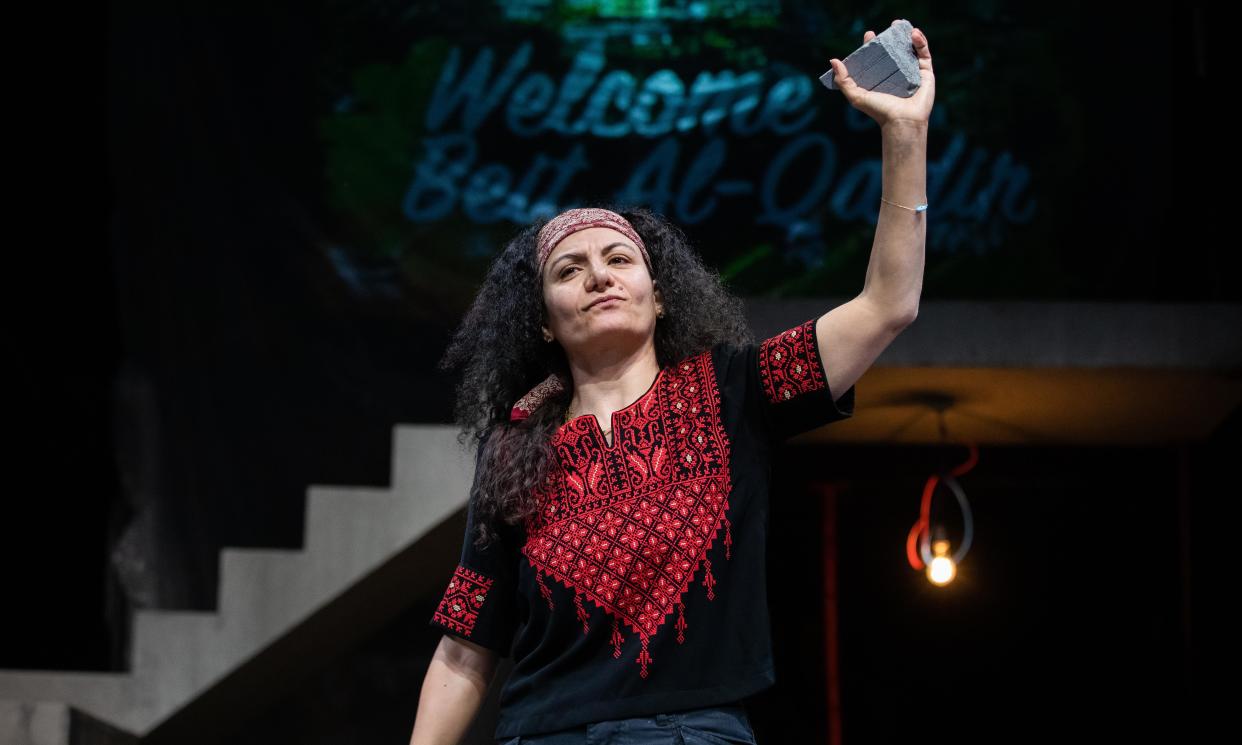Two Palestinians Go Dogging review – devastatingly human portrait of conflict sears itself on the mind

Don’t be fooled by the title. This is not – bar a few fruity scenes – a play about dogging, and there are more than two Palestinians in it. There are Israelis too, living in contested territory and enacting the fear, hostility and oppression of that conflict which has become so dreadfully familiar to us through news feeds that even the language around its reporting is inflammatory.
What this slowly rumbling earthquake of a show does so startlingly well is take the conflict and make it small, specific, multi-layered – yet as devastatingly epic as Greek tragedy. Sami Ibrahim’s script revolves around a Palestinian family living in a village east of Jerusalem and being slowly destroyed. Reem (Hala Omran, bolshy, mercurial) is its matriarch and our central narrator; alongside her is her melancholic husband, Sayeed (Miltos Yerolemou, just wonderful).
When an Israeli soldier, Sara (Mai Weisz), is murdered, there are calls for retribution; but Reem has her own scores to settle after her children are killed. Through her we get a sense of a community living under siege, seething with powerless anger, while Sayeed just emanates hopeless resignation.
This local focus on one family has echoes of Lorca, in its intractable grudge-bearing and cycles of violence. Reem tells us of the terror of the Red Zone, of Israeli troops taking sniper shots at unarmed Palestinians, of drone strikes on houses, of children being gunned down at point blank range – including her own 12-year-old girl and then a second daughter, Salwa (Sofia Danu).
Directed by Omar Elerian, the production is many things at once: playful and tragic, baggy and taut, always pulling back from whimsy at the tipping point of self-indulgence. Just as we are lulled by a moment of comedy or metafictive silliness, violence comes careering around the corner.
So many of its scenes stay seared on the mind: Reem watching a video of her son’s last moments; Sara begging for her life before it is horrifyingly stamped out. The saddest scene, for me, is a quiet one with Reem and Sayeed sitting side by side, she sifting lentils, he peeling an orange. “Can you imagine what it’d be like, not living here? Not doing all of this? … Protests and campaigns and watching people die?” he says to her, and she sounds nonplussed by such an implausible thought.
It is a play with a reach way beyond its fictive bounds, addressing everything from Palestinian martyrdom to the international community’s inaction over illegal settlements, while the recent, appalling killing of Shireen Abu Aqleh casts a long shadow. Yet there is no simple binary of Palestinian victimhood versus Israeli oppression here. Reem’s son, Jawad (Luca Kamleh Chapman), is a murderer turned mascot. Sara is given a voice beyond her death, and a searing scene brings a battle for supremacy between her and Salwa after they have died: the conflict is clearly never-ending, even reaching into the afterlife. Meanwhile, Sara’s father, Adam (Philipp Mogilnitskiy), gives us one of the play’s most furious satires on the absurdities of war.
Initially, Two Palestinians Go Dogging feels like a rambling piece of improv, beginning as a standup act and slowly turning into a family story set two decades into the future, in the midst of the “fifth intifada”. It seems deliberately scrappy, too: bare-boned in its staging with minimal props (some rocks, fake blood, microphones) and a set made of corrugated iron and draped sheets. All of which gives it a furtive sense of illicit street theatre that could be dismantled quickly if needed.
It also resembles a Complicite production in the meta-theatrical games it plays – sometimes too drawn out and distracting – and contains a boldness that is almost reckless in its dramatic risks. Every actor is in a flak jacket, and the performances are moving across the board. As a drama, it seems to call for action even as it tells us that the conflict is so unresolvable it will still be chugging on in 2046.
It ends with a letter from the playwright stating its own Truman Show artifice, but we walk out in discomfort, not able to ignore the fact that this fiction is someone’s reality. If I have a grumble it is that the show could be tighter, but it nonetheless comes with an enormous gut-punch, and is all that theatre should strive to be.
• At Royal Court theatre, London, until 1 June.

 Yahoo Movies
Yahoo Movies 
